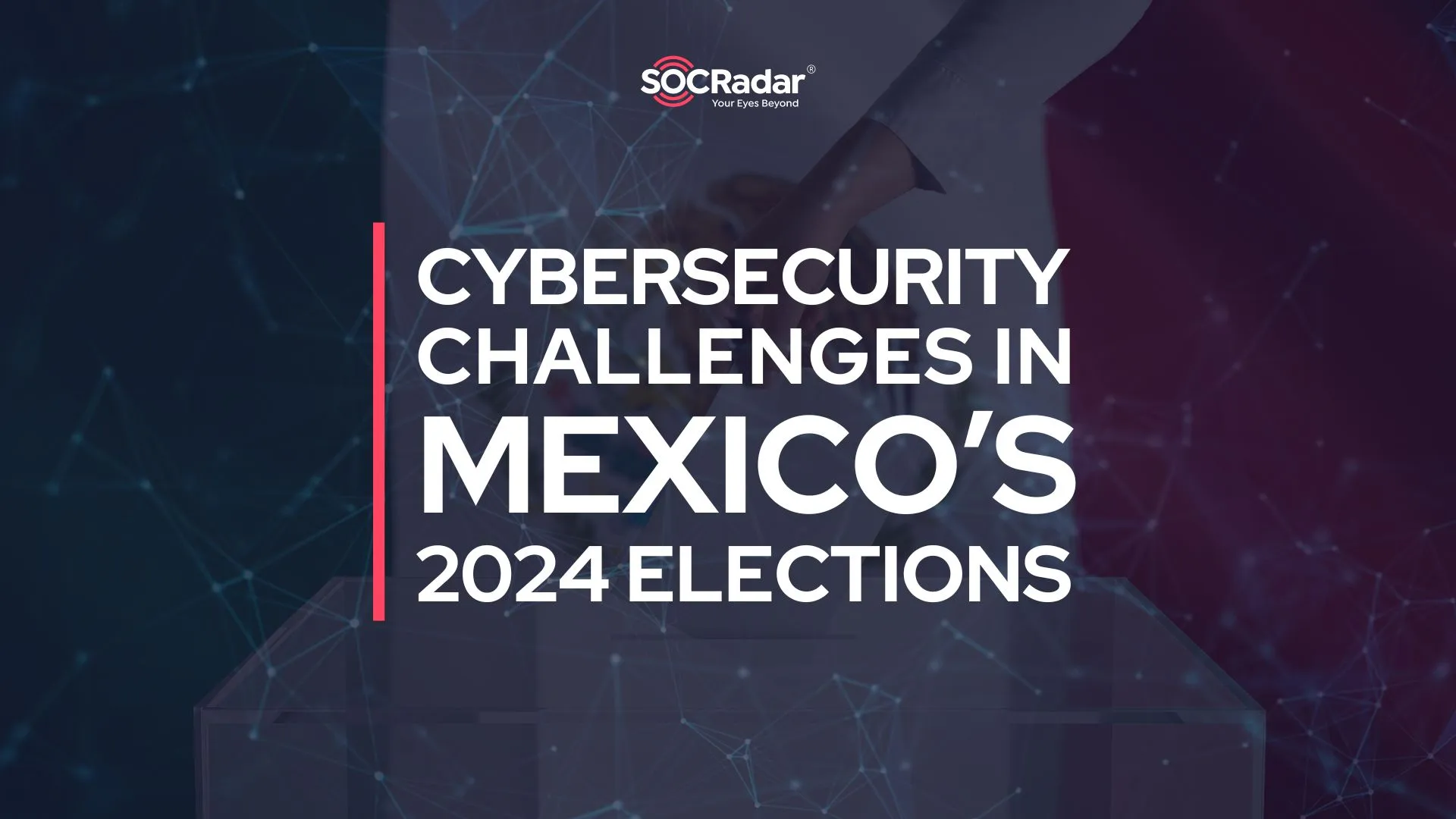
Cybersecurity Challenges in 2024 Mexico’s Elections
In Mexico, the general elections are scheduled for June 2, 2024. The nation’s decision will determine the new president who will govern the country for the next six years. Members of the Chamber of Deputies and the Senate of the Republic will also be elected based on the election results.
While there are many topics for voters to consider before the election, several issues are attracting more attention than others.
Violence and security represent the foremost challenges the new president will confront. Candidates must address these issues satisfactorily to secure victory in the elections. Cartels are targeting civilians and politicians, engaging in conflicts with rival cartels, generating anxiety among the citizens, and undermining Mexico’s international relations, thus tarnishing its reputation.
Corruption has been another longstanding issue in Mexico. Public institutions operate with a lack of transparency, and the situation has deteriorated further due to budget cuts and legal obstacles that have diminished the influence of anticorruption agencies at both the federal and state levels.
There is also a migration issue in Mexico. Unlike other nations, Mexico’s primary challenge regarding migration doesn’t stem from immigrants entering the country and seeking refuge there. Instead, it revolves around emigrants departing from Mexico to the USA. The agreements negotiated between administrations create distress for both sides.
In today’s world, the electoral landscape is vulnerable to digital threats, too. As Mexico approaches its upcoming elections, an analysis of digital challenges is necessary. From data leaks exposing the personal information of the nation to the utilization of spyware, these challenges pose significant risks to the democratic process.
Importance of a Secure Election Period for Mexico
Over the years, Mexico has become a major player in the global automotive market, attracting significant investments due to its strategic location, competitive labor costs, and extensive network of free trade agreements. While the automotive sector contributes significantly to Mexico’s GDP and offers employment opportunities, challenges such as sustainable growth and socio-economic disparities persist. Candidates must find a balance that satisfies both investors and the public, and before a new president takes office, the state’s security apparatus must guarantee a secure election period to protect this critical part of such a valuable market. While the automotive industry garners considerable attention regarding Mexico’s economy, it is not the only important one, and a downturn in its economic landscape will negatively impact various global markets.
Mexico’s dedication to democracy encounters challenges, mainly due to the rising populism within the nation. One significant risk is the erosion of democratic institutions and norms as populist figures try to concentrate power while weakening checks and balances. Additionally, this trend might strain Mexico’s international ties, especially if populist leaders embrace confrontational or nationalist strategies that disrupt diplomatic channels or global collaboration. Such actions could impact trade and security, thereby adding layers of complexity to Mexico’s and its partners’ future. To prevent this, it is crucial to be vigilant against disinformation campaigns that may sway voter behavior toward charismatic but potentially populist leaders.
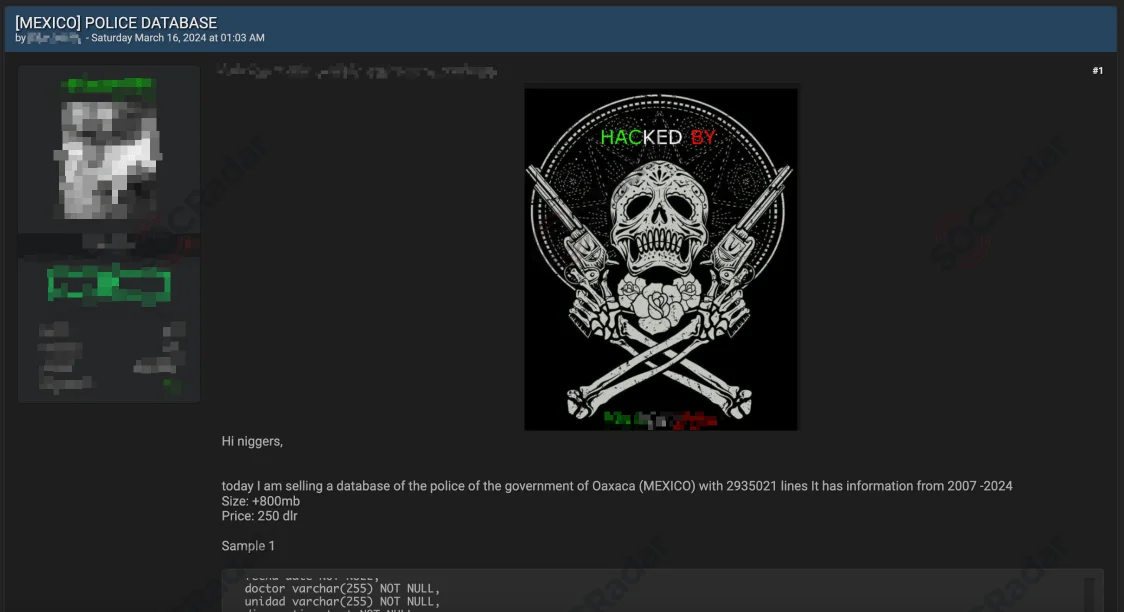
A threat actor is claiming to sell the Mexico Police database on a forum monitored by SOCRadar
The cartels and their operations pose another threat to a secure election process. Their illicit activities, including drug trafficking, human trafficking, and conflicts between rival cartels, pose a significant threat to society. While Mexico aims to combat this crime, it faces challenges due to the considerable power wielded by these cartels, coupled with their influence over corrupt officials.
Moreover, potential data leaks, such as the claim mentioned above, leave security personnel vulnerable to cartels’ brutality, making it harder for the state to fight these criminal organizations. Cartels can exploit such leaks to influence government officials and expand their reach further. This violence not only jeopardizes the safety and security of Mexican citizens but also strains the country’s relations with neighboring nations and the international community at large. The impact extends beyond domestic borders, with ramifications felt across various domains, such as the economy.
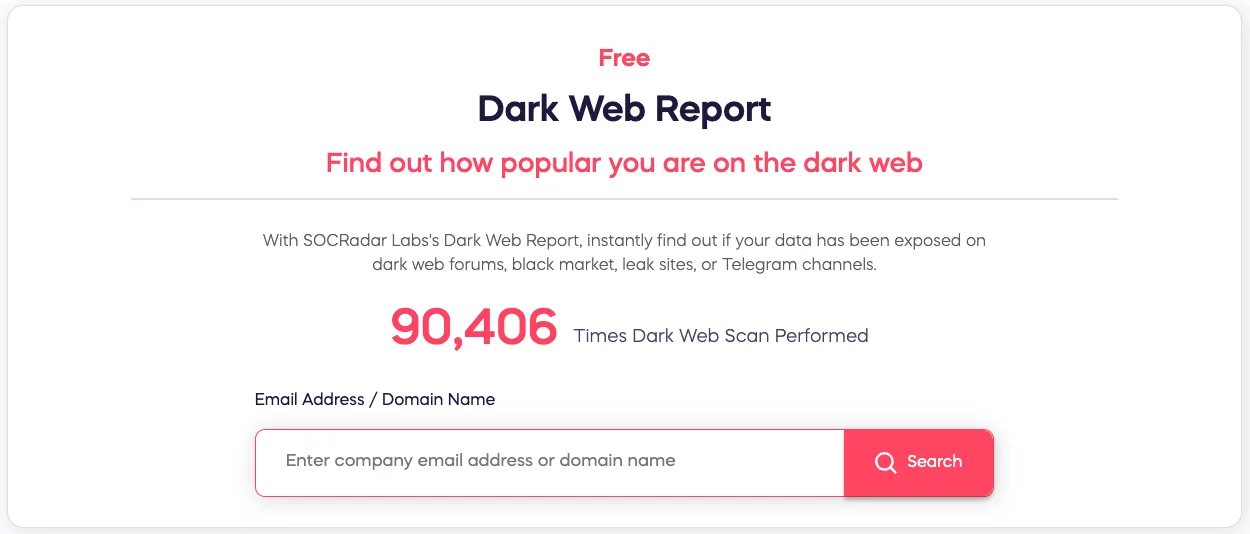
SOCRadar’s Free Dark Web Report Service
Detecting the leaks in your organization is one of the first steps you need to take to prevent them. You can use SOCRadar’s free Dark Web Report tool to detect if threat actors are trying to sell your data and thus locate the problem in your system.
Possible Threats for Mexico’s Upcoming Elections
While certain aspects of the local dynamics necessitate a tailored approach to combat specific issues, the threat landscape during this election period in Mexico bears similarities to the risks encountered during other elections.
Among these risks are data leaks, where citizens’ personal information can be exploited and used to interfere in the elections. With the rise of AI technologies, creating deepfake content has become relatively easy, yielding astonishing results. It is not difficult to fabricate fake images and manipulate the public shortly before the elections.
Since Mexico is utilizing an e-voting technology, vulnerabilities inherent in these machines can also pose risks. Some tactics adversaries may employ to interfere with the elections are stolen votes, disruptions of machine functionality, and the propagation of disinformation campaigns.
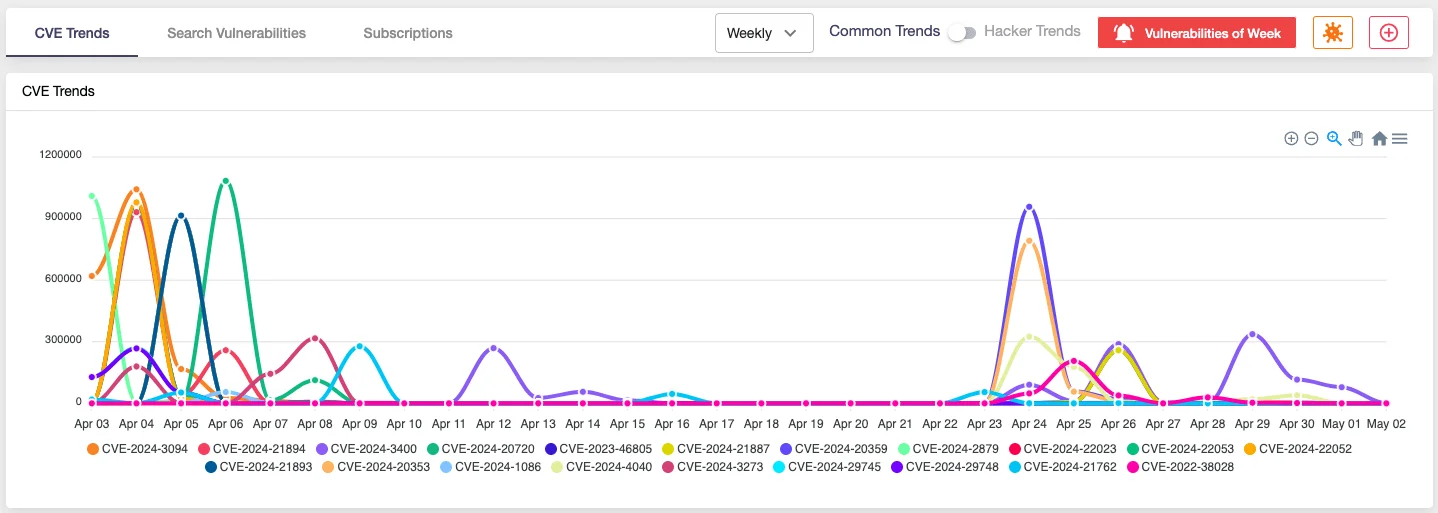
SOCRadar Vulnerability Intelligence Module will show you real-time information about the latest vulnerabilities
Suppose you are worried about the possible vulnerabilities in your systems that threat actors can exploit. In that case, you can try SOCRadar’s Vulnerability Intelligence module to get accurate information about your systems and find out about your vulnerabilities.
Additionally, Mexico has begun to attract attention with the officials’ extensive use of spyware. The exploitation of such technologies by state actors undermines democratic institutions in the country and creates a suitable environment for various malicious activities that can grow further and harm the nation.
Risk of Data Leaks in Mexico’s Elections
Data leaks represent a significant threat to the integrity of the elections. They can expose sensitive voter information, including personal data, enabling threat actors to exploit them for tailored disinformation campaigns. Social media platforms serve as conduits for disseminating political messages and influencing public opinion. The disclosure of a data leak from a reputable government body would harm the democratic process.
Below is an announcement from a threat actor claiming to have email conversations of the Government of Mexico City and sharing them for free. While numerous accounts purport to sell or share valuable information about various targets, not all are genuine leaks.
In the event of a legitimate leak from the Government of Mexico City, any adversary, whether a threat actor or a cartel, seeking to interfere in Mexico’s politics could exploit the shared information to inflict damage on the Mexican government.

SOCRadar has detected a threat actor claiming to share emails from the Government of Mexico City
Deepfakes & AI, Disinformation and Social Media
When it comes to elections, disinformation emerges as a prominent issue. It is almost inevitable that during any election period worldwide, political parties resort to blaming each other with falsehoods or attempts at spreading disinformation. With the widespread adoption of AI tools, the creation of disinformation campaigns has become increasingly effortless.
Disinformation campaigns can exploit any narrative for their objectives, ranging from petty crimes to corruption scandals or seemingly benign interactions between citizens discussing the nation’s future.
In the context of the upcoming elections in Mexico, we have distilled the vast array of potential topics into several key areas at the beginning of the article. Further refinement of these points is essential for authorities to determine the threats they may face.
Voters’ expectations, the pressing issues facing Mexico, and the promises made by candidates are key domains to explore to achieve this goal. These aspects represent the pain points any disinformation campaign will target to gain traction and achieve its objectives.
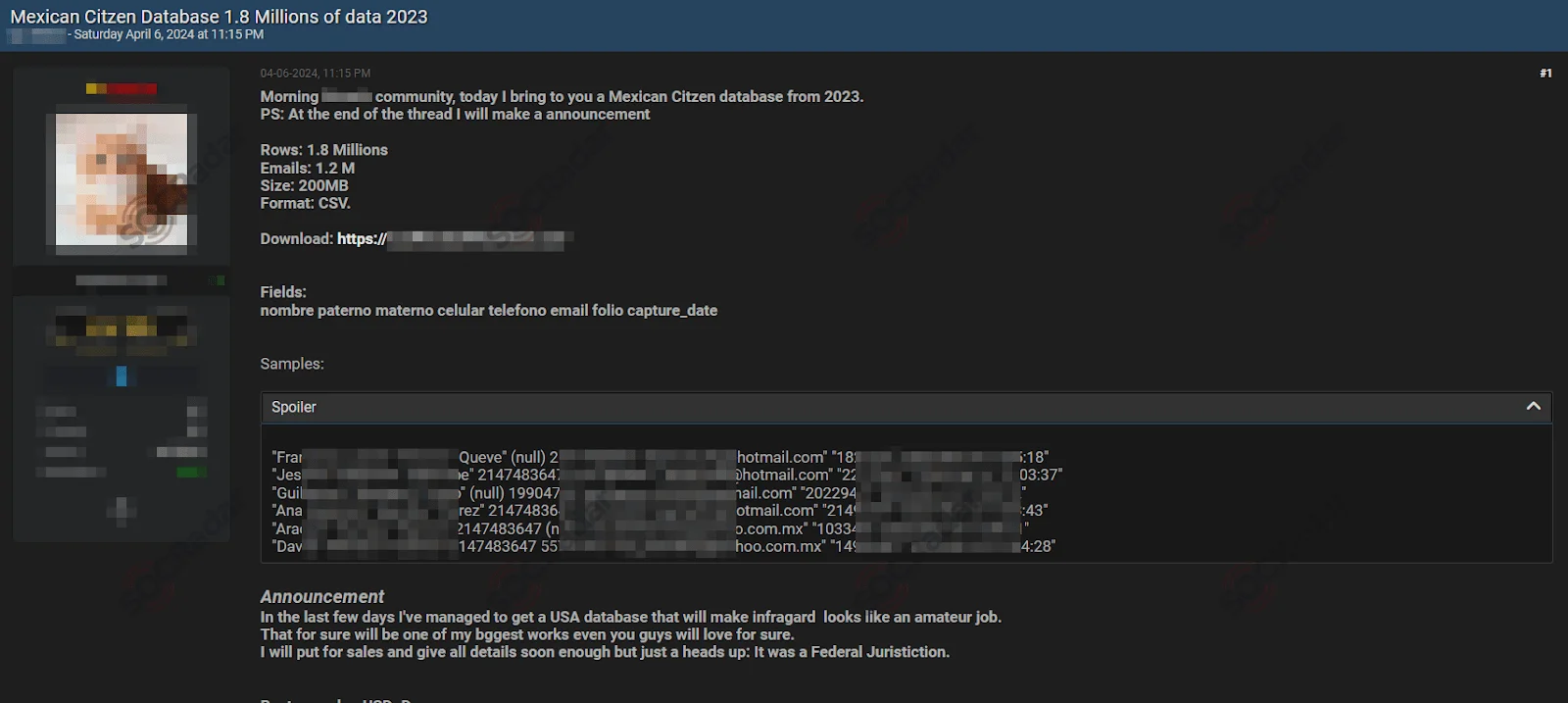
A threat actor detected by SOCRadar claiming to have a dataset of Mexican citizens
The utilization of AI and deepfake content extends beyond disinformation campaigns; they can also be exploited to generate counterfeit IDs or documents for various illicit purposes.
Above, you see a post from a threat actor claiming to have obtained the Mexican citizens’ data. Such leaks can allow adversaries to utilize the data to create AI-generated documents for their illicit purposes. ID cards, ballots, checks, and various other documents can be generated easily using the tools available today.
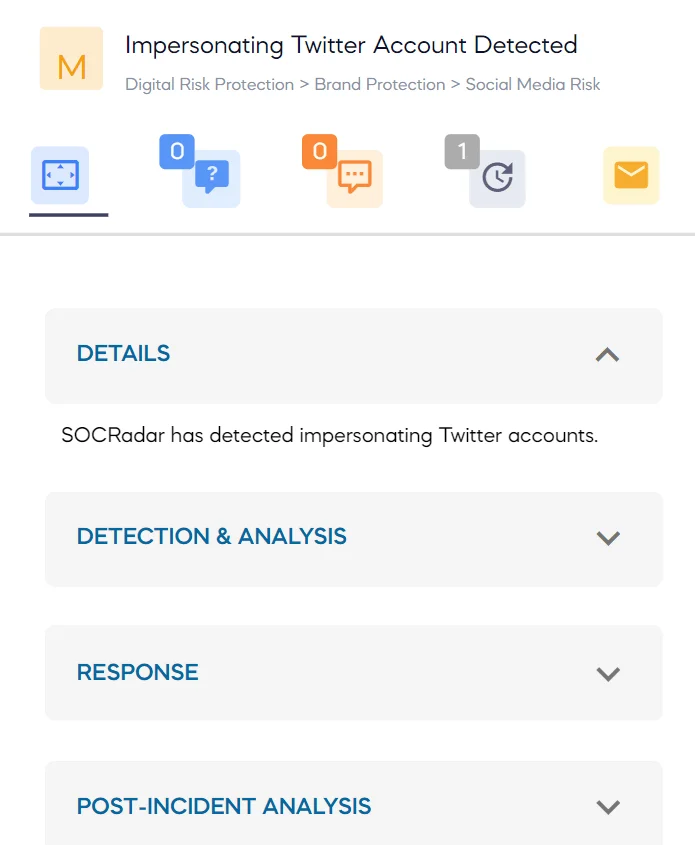
You can get rid of impersonating accounts with the SOCRadar Integrated Takedown module
Disinformation can also manifest through the use of counterfeit social media handles. Threat actors may craft accounts resembling the original brand to defraud its customers. Phishing attacks, malicious emails, and direct outreach via social media represent some of the methods employed by these actors. SOCRadar can cover your back and help you protect your brand’s reputation. By leveraging SOCRadar’s Integrated Takedown module, you can effectively eliminate the threat of such scams.
E-Voting
With the advancement of technology, new solutions for elections have emerged, including electronic voting systems. However, these systems often raise suspicions about election integrity due to security concerns.
E-voting systems are vulnerable to various cybersecurity threats, and if attackers compromise the integrity of these voting systems, they could manipulate election results, erode voter confidence, and jeopardize the democratic process.
These systems also raise privacy concerns. Governments must guarantee the confidentiality and anonymity of voters’ choices because inadequate security measures or data breaches could jeopardize voter privacy, prompting worries about state surveillance, identity theft, or even coercion.
When discussing electronic voting, we typically think of machines. However, the upcoming elections in Mexico will mark the second instance of utilizing internet voting, a development that heightens suspicions. This new approach makes it easier to spark disinformation campaigns and presents new challenges for officials in safeguarding the systems.
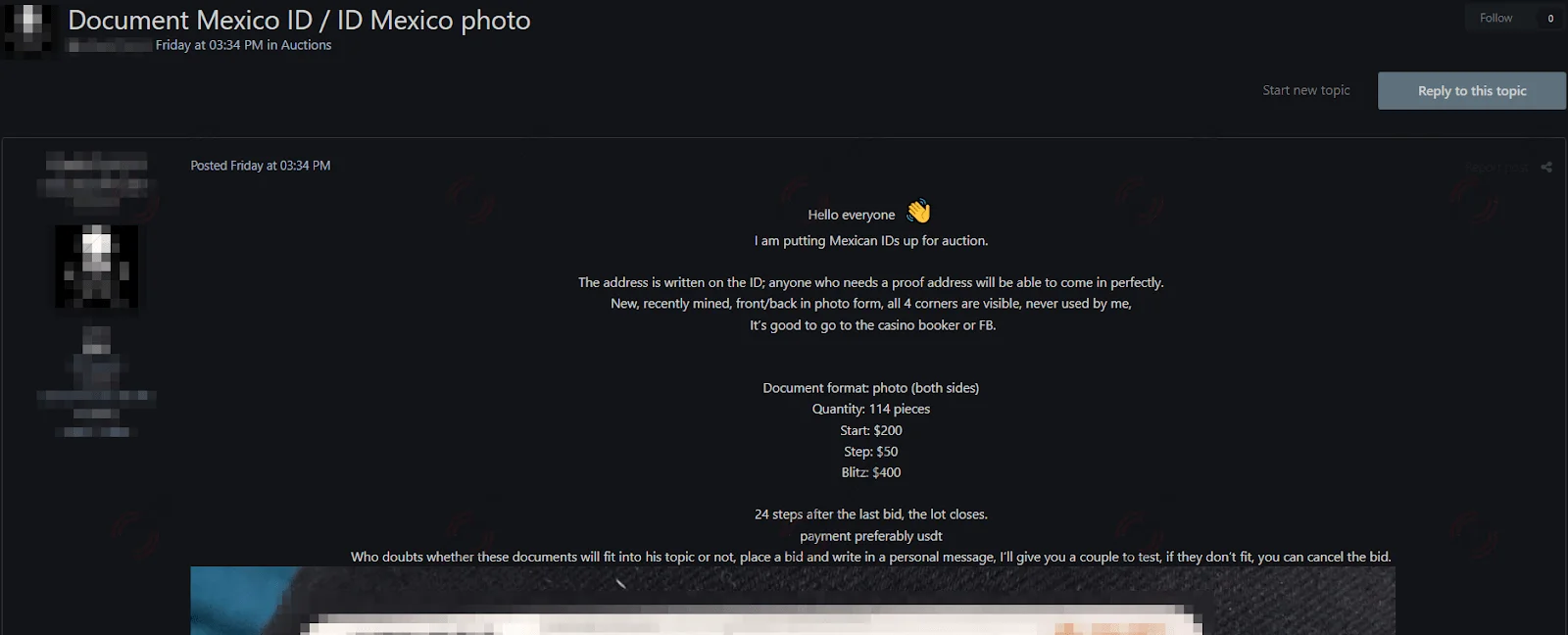
SOCRadar has detected a threat actor claiming to sell images of ID cards belonging to Mexican citizens
For instance, many services nowadays employ ID verification to ensure the authenticity of user accounts. However, with data leaks exposing detailed personal information such as ID cards, attackers can exploit this information to circumvent verification systems. When voters can use an online service to select the country’s next president, threat actors could leverage such leaked images to bypass the related security measures and interfere with the election process.
Spyware
While claims about the use of spyware are widespread globally, recent revelations from Mexico have heightened suspicion regarding the intentions of the ruling elite about the upcoming elections on June 2. Utilizing such tools fosters distrust between parties and undermines Mexico’s pursuit of non-partisan policies. Serious developments of this nature also strain the relationship between political parties and the public.
According to a report from Citizen Lab, security forces use spyware extensively in Mexico, and there has been significant turmoil surrounding the use of Pegasus spyware against politicians, bureaucrats, and journalists in the country. This topic traces back to 2017 when Citizen Lab, in collaboration with its partners, released a series of reports shedding light on this issue. The topic continues to dominate public discourse today.
The deployment of such applications by government forces undermines democratic processes and erodes public trust in governance. Additionally, it fosters an environment suitable for disinformation campaigns, further worsening societal divisions.
Conclusion
In today’s age, information is easily accessible. However, the abundance of data can overwhelm decision-makers, and they need accurate intelligence to help them navigate this wealth of information. Authorities must implement proactive measures to safeguard democratic principles in Mexico because it becomes harder to repair once the damage is done.
The SOCRadar Extended Threat Intelligence can help detect threats before they cause irreparable harm.




































